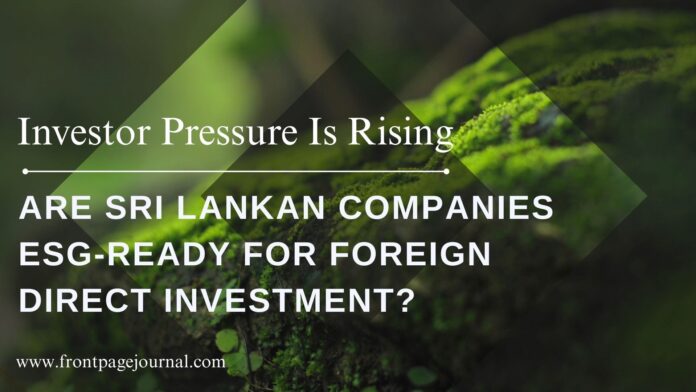As global capital flows shift toward climate-aligned, socially responsible, and governance-conscious enterprises, the rules of investment attraction are changing. Environmental, Social, and Governance (ESG) metrics are no longer a niche requirement or a voluntary reporting exercise. They have become a central filter through which institutional investors, private equity firms, and development finance institutions assess risk, resilience, and long-term value. For Sri Lankan companies looking to attract foreign direct investment, joint venture opportunities, or ESG-linked financing, the readiness to meet these standards is becoming a defining competitive factor.
Around the world, funds are reallocating portfolios to prioritize sustainable investments. BlackRock, the world’s largest asset manager, has made ESG risk assessment a standard part of its investment review. Sovereign wealth funds are developing green mandates. Development banks such as the IFC and ADB are demanding ESG disclosures from project partners. Private equity firms now embed ESG due diligence into their term sheets, requiring clear metrics on emissions, labor practices, board composition, and community impact. The message is clear: ESG performance is not peripheral to financial performance. It is intrinsic to it.
For Sri Lankan enterprises, this presents both a challenge and an opportunity. Many local firms, particularly in manufacturing, agribusiness, apparel, construction, and logistics, are well-positioned in terms of operations but have not yet formalized their ESG frameworks. They may already be engaging in sustainable practices such as waste reduction, renewable energy adoption, or community engagement, but these initiatives remain undocumented or unaudited. Without structured reporting and third-party verification, they remain invisible to global investors.
The first step toward ESG readiness is standardization. Companies must begin measuring key indicators using accepted global frameworks such as the GRI (Global Reporting Initiative), SASB (Sustainability Accounting Standards Board), and TCFD (Task Force on Climate-related Financial Disclosures). Investors are not looking for perfection. They are looking for transparency, progress, and a clear governance structure to manage ESG risks and opportunities. A basic ESG policy, a set of measurable targets, and a commitment to annual disclosure are often sufficient to open the door for engagement.
Environmental factors are the most urgent. Companies must be able to report on their carbon emissions, energy use, water consumption, and environmental compliance. With the EU’s Carbon Border Adjustment Mechanism and similar policies expanding, exporters without a carbon reduction strategy may be penalized in trade and overlooked by investors seeking climate-aligned portfolios. Firms that can demonstrate decarbonization plans, green certifications, and energy efficiency upgrades will be more attractive to partners seeking both financial and reputational returns.
Social indicators are also under increased scrutiny. Investors want assurance that companies treat workers fairly, respect diversity, and operate without exploitation. In sectors such as apparel and agriculture, labor rights and community relations are not just ethical concerns. They are risk indicators. One unresolved labor dispute or a supply chain linked to poor working conditions can trigger reputational damage and lead to withdrawal of funding. Companies that institutionalize fair labor practices, local stakeholder engagement, and inclusive hiring will stand out in ESG due diligence.
Governance is the third pillar, and arguably the most strategic. Investors want to see strong internal controls, board diversity, anti-corruption measures, and ethical leadership. In Sri Lanka, where governance challenges have occasionally impacted business credibility, demonstrating a robust governance framework can serve as a differentiator. This includes clear reporting lines, independent audit functions, documented codes of ethics, and whistleblower protections. Boards must be involved in ESG oversight, not merely informed after the fact.
For CEOs and CFOs, ESG readiness must now be treated as an investment strategy, not a communications exercise. It requires cross-functional collaboration between finance, operations, HR, and sustainability teams. It involves aligning ESG efforts with business goals, identifying material issues, and setting realistic improvement pathways. Most importantly, it demands executive sponsorship and accountability. Without leadership commitment, ESG remains a box-ticking exercise. With it, ESG becomes a value creator.
Sri Lanka has an added incentive to lead in ESG alignment. As a developing country with ambitions to attract more FDI and integrate into sustainable global supply chains, positioning as an ESG-compliant investment destination will unlock new flows of capital. Green bonds, climate funds, blended finance instruments, and impact investments are increasingly available to companies that meet ESG criteria. Local banks and DFIs are also starting to align loan terms and interest rates to ESG performance.
The time to act is now. Global investors are moving their capital where sustainability is measured, managed, and reported. Sri Lankan companies that delay ESG adoption may find themselves priced out of global partnerships or excluded from procurement frameworks of multinational buyers. Those that move early will gain not just financial capital but strategic partnerships, reputational strength, and long-term resilience.
ESG is no longer a future trend. It is today’s investment language. And readiness is no longer optional. It is foundational. The companies that recognize this shift and operationalize ESG will be the ones that define Sri Lanka’s next era of international growth.




